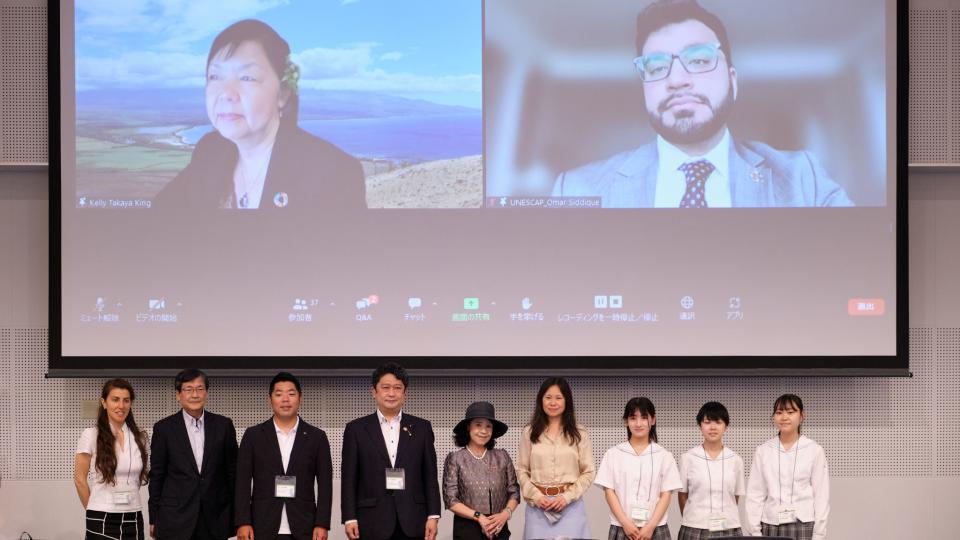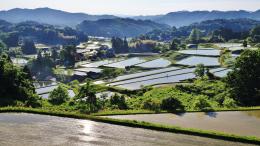On 21 July 2022, UNU-IAS held a side event of the Climate & SDGs Synergy Conference which discussed the growing role of sub-national actors in accelerating social transformation for net-zero emissions and sustainable development.
The event explored good practices, opportunities and challenges for multi-stakeholder partnerships and youth empowerment to accelerate local action on climate change and sustainable development. It brought together diverse perspectives from the UN system, academia, civil society, youth, and local communities actively involved in climate action and the SDGs.
In opening remarks, Shinobu Yume Yamaguchi (Director, UNU-IAS) underlined that transformative action was only possible, effective, and equitable when we work together in partnership. She outlined how UNU-IAS was building partnerships to generate, mobilise, and scale up local knowledge, including initiatives through its Operating Unit Ishikawa/Kanazawa (OUIK) to develop and implement local SDGs indicators and sustainable tourism indicators. UNU-IAS outreach activities have made international debates more accessible to local audiences, and built capacity to strengthen local leadership in Asia and beyond, through activities such as the Mayors Academy for Sustainable Urban Development.
Takashi Murayama (Mayor of Kanazawa City, Japan) introduced Kanazawa City’s public–private partnerships for SDGs localisation, and initiatives on green infrastructure and sustainable urban nature. The Kanazawa SDGs 5 Courses of Action include: “a city that is old, new, and comfortable”, “a city with zero waste”, “a city where children can dream”, “a city where both a satisfying job and a satisfying life are attainable” and “a city that gives birth to new objects and ideas”.
Sharing a business perspective, Taizo Hayashi (President, Junior Chamber International Kanazawa) provided an overview of the Japan Junior Chamber International Kanazawa, its initiatives, and efforts towards achieving the SDGs. In 2015 Junior Chamber International (JCI) adopted the Kanazawa Declaration, which committed JCI to positive action toward achieving the SDGs.
Addressing the connection between universities and communities, Aida Mammadova (Associate Professor, Kanazawa University) explained how Kanazawa University was taking advantage of its location to advance the SDGs. She emphasised the need to combine local and global activities for capacity building and the key role played by young people, whom she considered an engine for climate action and achieving sustainable societies.
Providing a youth perspective, Hinata Murakami (Pla-girls Team, Ehime University Senior High School), explained how the “Pla-girls Team” were conducting research to help solve problems related to microplastics, including reducing microplastics pollution in marine ecosystems by utilising marine bacteria to produce biodegradable plastics.
Xiaomeng Shen (Vice-Rector in Europe, UNU and Director, UNU-EHS) presented a case study of muti-stakeholder engagement in Africa, emphasising that youth and women could play a pivotal role in the African economy. She also introduced a case from Spain as part of the multi-stakeholder RethinkAction project.
Kelly Takaya King (Council member, Maui County Council, Hawaii; ICLEI US) explained the juxtaposition of nature and development on Maui and highlighted the need to collaborate on sustainable development in order to sustain resources and combat climate change. She introduced the Aloha+ Challenge, a locally driven framework for the SDGs.
Omar Siddique (Cities and Climate Change Lead, Sustainable Urban Development Section, Environment and Development Division, UNESCAP) presented a snapshot of the Asia-Pacific region’s progress on the SDGs. He underscored the need for multi-level governance frameworks due to the complexity and scale of climate change, and the importance of creating an enabling environment for climate action.
The event was moderated by Tsunao Watanabe (Senior Programme Coordinator, UNU-IAS).




